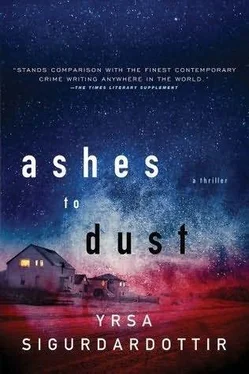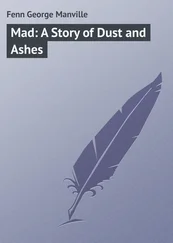
Yrsa Sigurdardottir
Ashes To Dust
The third book in the Thóra Gudmundsdóttir series, 2010
I wish to thank all the residents of the Westmann Islands, who assisted me as I wrote this book. Foremost among them is Kristin Johannsdottir, who could not have been more helpful. Sigmundur Gisli Einarsson, Olafur M. Kristinsson and Arni Johnsen also receive thanks for their helpfulness, as well as the expatriate Westmann Islander Gisli Baldvinsson. None of these individuals is a model for any character in the book.
I dedicate this book to my publisher, Petur Mar Olafsson, with heartfelt appreciation for his outstanding cooperation and boundless patience.
– Yrsa
She had often considered death to be a desirable option. Today, however, she hadn’t been feeling that way, which was rather unfortunate in light of the circumstances. When her father had died after a difficult struggle with cancer, she’d wondered what the point of everything was. How short and insignificant a life is when all is said and done, she had thought. Her father had been the lynchpin of their little family, but months later she had trouble recalling how he looked without the aid of a photograph. And she had supposedly been one of the closest to him – how quickly were others forgetting him? Once her mother had passed away, as well as herself and her sister, no one would remember him, and it would be as if he had never set foot on this earth. The thought filled her with despair. Now, as she stared her own fate in the face, she realized that her story would never be told. She would never be able to make a clean breast of it as she had intended. No one else could make sense of all this, much less explain the events that had recently overtaken her. Everything was going black, but she managed to snap herself out of it. She knew that when it happened next she might not be able to resist.
If she weren’t so weak and confused, she could at least try to defend herself instead of lying here, letting it happen. She must have been given drugs of some sort; this kind of drowsiness didn’t occur naturally. On the bedside table stood a bottle of pills that she didn’t recall placing there, but by squinting she could see that it contained the powerful painkillers she’d come home with after her last operation. The bottle had sat untouched in her medicine cabinet for months and it was unthinkable that she’d fetched it herself, let alone taken the pills in any large dosage. She had no memory of swallowing them, so it seemed highly likely that they’d been put in her food earlier. She remembered the taste of the pills only too well, and there was no way the wine she’d drunk would have masked it. The foul taste of the vomit in her mouth was not from the pills – but that in itself meant nothing. She retched again and closed her eyes, even though she was afraid she wouldn’t be able to open them again. This fear proved unfounded, because they flew open reflexively when a heavy weight descended on her, expelling the breath from her lungs. Her eyes were covered by an ice- cold hand, shutting out the light.
Her racing heart beat faster still when another hand prised open her mouth and groping fingers pushed their way in. Her feet kicked in impotent protest. Her tongue was yanked out of her mouth and after a moment she felt an agonizing sting. A painful heat spread slowly from the puncture wound, over and through her tongue, and she realized that something was being injected into the soft tissue. When her tongue was released, the hand gripped her nose.
Her thoughts became less distinct, foggier. Was she maybe in hospital, under the hands of a doctor? She couldn’t open her eyes and could smell nothing through her nose, which was held shut, but she hoped that this was the case. A low whisper in her ear: It’s almost over- relax. Was this a doctor or a nurse? She tried unsuccessfully to recall who had been with her before she became dizzy and started vomiting. She was sure she knew, but found it impossible to recall her visitor’s name or face. Abruptly, the thought came to her that she still had to buy a birthday present for her sister. What should she give her? A jumper maybe? There were so many beautiful jumpers to choose from. But then she realized that this was neither the time nor the place to think about such a thing. Which reminded her, she not only didn’t know where she was, but also what time it was. Was it night or day? How long had it been since the injection in her tongue – if that had even happened? The hold on her nose was released, her mouth was re-opened and the fingers crept back in. She recognized them by their soapy taste. They prodded her tongue, and she could feel that something was wrong. She tried to move her tongue, without success. Maybe she was having a stroke? A stroke could actually manifest such symptoms. What else could it be? She couldn’t think. Suddenly the fingers were pressed firmly against her tongue, rolling it and forcing it back into her throat. It made no difference how she fought to free her tongue from this deadly grip – it wouldn’t let up. The knees of the person sitting on top of her had trapped her hands at her sides. In despair she tried to remember everything that she knew about strokes, but she could not recall whether paralysis of the tongue was a symptom.
Garbled curses, sounding like they came from inside a barrel or the end of a long tunnel, echoed in her mind. She couldn’t tell if she was imagining them, or if they came from whoever was so mistreating her mouth. She tried to say something, expecting her voice to sound the way it did when she attempted to speak at the dentist’s -which reminded her, she needed to make an appointment – but all that came out was a moan that seemed to originate in her abdomen. Her tongue still would not move despite repeated messages from her brain, making it impossible for her to change sounds into words. Suddenly the fingers were pressing even harder against it. She could feel her tongue perfectly even though she couldn’t move it, and she gagged as it was pushed back into her throat. Her eyes opened wide and she stared at the familiar ceiling panels.
The fingers released her tongue and the weight was lifted from her stomach and hands, but this did not relieve her at all. She tried desperately to catch her breath. Mad with fear, she attempted to think clearly, but could not. Her tongue was stuck fast in her gullet. Her feet kicked, drumming on the mattress in furious convulsions. Her hands clawed at the soft skin of her neck and jaw – maybe she could make a hole for air to come in?
Then everything went black and she was gone, like her father. He had been happy to say farewell to his life, unlike her. The terrible sounds that had emerged from her as she fought for breath had ceased. Her head sunk slowly to one side and she lay in a pool of blood, her eyes full of anguish. Everything was quiet for a moment, then a CD player on the other bedside table was switched on and music started to play.
Shortly afterwards the woman’s visitor gently closed the bedroom door, showing far more courtesy than he had previously displayed.
Monday 9 July 2007
‘You’re trying to tell me Markus is just tidying the basement? You can’t possibly believe that a pile of rubbish is the reason that he didn’t want anyone to go down there before him?’
The lawyer Thóra Gudmundsdóttir smiled politely at the man addressing her, an archaeologist called Hjortur Fridriksson, but did not answer his question. This was getting out of hand. She was very uncomfortable; the smell of smoke and the ash hanging in the air was irritating her eyes and nose, and she was scared that the roof was going to collapse at any moment. On their way through the house to the basement door the three of them had had to make their way around a huge pile of ashy debris where the roof had collapsed onto the intricately patterned carpet, at which point Thóra had adjusted her helmet’s elastic chin-strap to ensure that it was fastened tightly. She shuffled her feet and looked embarrassedly at the clock. They heard a dull thud from the basement. What exactly was the man up to? Markus had said that he needed a little time, but neither she nor the archaeologist could guess what his definition of ‘a little’ was. ‘I’m sure he’ll reappear soon,’ she said, without much conviction, and stared at the crooked door in the hope that it would be pushed open and this business concluded. She glanced instinctively at the ceiling, ready to jump away if it appeared likely to crash down on them.
Читать дальше













